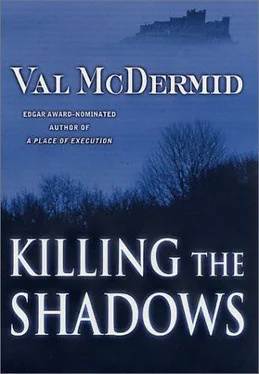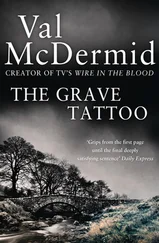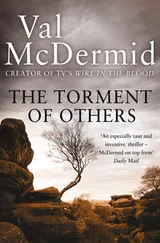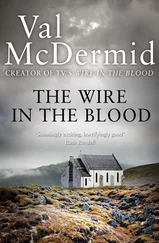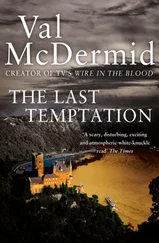For once, she had something firm to hang her analysis on. It was clear that each of the three murders had been modelled on an episode from a book written by the victim. The Irish Police’s arrest of a suspect had diverted attention away from that, but Duvall had made it clear to her that the Garda would be reviewing their position in the light of Redford’s confession. She had no doubt that their suspect would be freed shortly.
What was clear was that each of the victims must have been stalked. One of the things she’d have to check out over the next few days was how much information about each of them was readily available in the public domain. With luck, some of that material would be in the murder files already. And of course, the police forces involved would be trawling for fresh witnesses now they had a suspect whose photograph they could release.
For Fiona, the task was more subtle. And for once, she could work at her own pace. The chances were, as Kit pointed out, that Duvall was right. This time there was no ticking time bomb of a killer preparing to strike again.
DC Joanne Gibb walked down the corridor to Steve Preston’s office with a bounce in her stride that seemed to deny the hours she’d spent hunched over her computer running criminal-records checks against everyone on the electoral roll in a clutch of streets on the borders of Kentish Town and Tufnell Park.
She’d been practically cross-eyed with fatigue and on the point of tears of frustration at the fruitlessness of her task when the phone had rung. The previous day, she’d tried to contact the local information collator at the police station serving the area Terry had identified, only to discover the constable who ran their card index was on holiday and not due back until Monday. It had felt like the last straw, but she’d hacked on through her lists, hoping against hope she’d still turn something up.
Then, late morning, the call had come through. The collator, Darren Watson, had dropped by the station to pick something up and he’d seen the message marked ‘urgent’ from Joanne. At the end of her rope and almost without hope, Joanne had outlined what she was looking for.
“Right,” Darren had said. “A couple of likely lads spring to mind. Why don’t you come over and we’ll have a look?”
“Now?” Joanne could hardly believe her luck. In her experience, police on their day off would do almost anything to avoid being dragged on duty.
“Sure. I’ve just come back from a week in a cottage in Cornwall with my other half, and frankly, anything that keeps me out of the house for an hour or two would be a bonus. Get yourself over here and we’ll see what we can dig out.”
Joanne didn’t need asking twice. She’d practically run downstairs to her car and invited several outbreaks of road rage on her way to the North London police station where Darren Watson might just have the answer to her prayers. Local Information Officers were responsible for maintaining the informal intelligence of the station. As well as keeping a card index file of every known villain on the patch with details of their convictions, a good collator recorded associates, suspicions and gossip. There were sound reasons why much of what they had tucked away was never entered into a computer. A card could always be conveniently misplaced, whereas even deleted computer records left traces. Omniscience coupled with deniability was the hallmark of a good collator. Joanne hoped that was what she was going to find.
Barren was in a small subterranean office that had the atmosphere of a wartime command bunker. One wall was covered with large-scale maps of the area, with pins in a variety of colours marking specific locations. Another was lined with filing cabinets. Shelving along a third wall sagged under the weight of box files piled along its length. Darren was sitting on the edge of the desk that occupied most of the fourth wall, dressed in his civvies: a navy fleece over a white T — shirt, blue jeans and brilliant-white trainers. Joanne’s first thought was that if his appearance was anything to go by, Barren’s files would be immaculate. Joanne was acutely aware that the attrition of the day’s work on top of too little sleep had left her a long way behind the collator in the grooming stakes.
They introduced themselves and Joanne came straight to the point. “Like I told you, I’m trying to develop a suspect in a series of rapes. We have reason to believe he might be on your patch. I’ve done a trawl through electoral records, but I’ve come up with a blank. We think he might have a record for minor sexual offences maybe even attempted rape. What we’re looking for is an offender who works out of doors, who targets white women, usually blonde. He may ride a bike in his getaways and he uses a knife in his attacks. It’s possible that some of his attacks may have been witnessed by small children.”
Barren pushed off from the desk and headed for his filing cabinets. “I’ve been giving it some thought and I’ve come up with two names.” He hauled open one of the card index drawers and flicked through. “There we go.” He took out a small bundle of cards held together with an elastic band. “Gordon Harold Armstrong.” He handed the cards over to Joanne and moved to another drawer.
Gordon Harold Armstrong was twenty-five, unemployed, and had been in and out of prison for burglary and indecent assault. His technique was to grab women on their way home from work, fondle their breasts and expose himself. He had threatened three of his victims with a knife. There was no mention of a bike. But for Joanne, the crucial disqualifying factor was that Gordon Harold Armstrong was black. And based on both Fiona’s analysis of Susan Blanchard’s murder and the evidence of the rape victims, the man she was looking for was white.
Darren turned to her with a single card. “Any joy, do you think?”
Joanne shook her head. “I think I’m looking for an ICi.”
Darren proffered the card. “Try this one.”
Gerard Patrick Coyne, twenty-seven years old. New Zealand-born, he had arrived in the UK as an eighteen-year-old student. Which explained his absence from the voters’ roll, Joanne realized. Having graduated from Kent University with a social sciences degree, he had worked for various market research companies as a data analyst ever since. His first arrest had come four years previously after a woman had complained he had attacked her in a local park. He had pushed her to the ground and tried to have sex with her. But she’d struggled and got away from him. The charges were later dropped on the grounds of insufficient evidence. He’d been arrested for the second time a few months later. A foot patrol had found him lurking in the bushes of another park, this time carrying a knife. He’d been charged with possession of an offensive weapon and had been given two years’ probation. According to the notes on the back of the card, Coyne had been a suspect in two other sexual assaults. In one case, the victim had been too traumatized to take part in an identification parade. In the other, the woman had been unable to pick Coyne out of the line-up.
Coyne, not surprisingly for a sex offender, had no known criminal associates. What he did have was a bike. Darren Watson’s scrupulous notes revealed that he was a member of a local cycling club and had won several road races.
Joanne allowed a slow smile to spread across her face. “Darren, you are a star,” she said, waving the card like a winning lottery ticket.
“You like our Mr. Coyne, do you?”
“Like him? I love him.” As she spoke, Joanne pulled her notebook out of her handbag and began to copy down Coyne’s details. Address, date of birth, date of arrests and his conviction for the offensive weapon charge. And the name of his cycling club.
Читать дальше
Конец ознакомительного отрывка
Купить книгу
